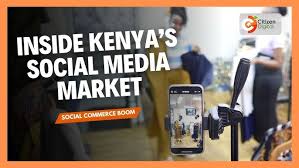The New Marketplace
Not long ago, shopping in Kenya meant walking into physical stalls, handling cash, and bargaining face-to-face.
Today, that scene has shifted to the glow of smartphone screens. On apps like Instagram, Facebook, and TikTok, a new wave of traders is turning posts, reels, and livestreams into thriving online shops.
This trend — known as social commerce — is transforming how Kenyans buy and sell everything from second-hand fashion to home décor, beauty products, and electronics.
With just a smartphone, an internet connection, and a ring light, anyone can now turn their social media page into a digital storefront.
Meet the New-Age Traders
In the bustling streets of Nairobi, Paul Opiyo, a mobile phone accessories seller, has become one of many Kenyans riding this digital wave.
“I started by selling purely on social media before opening my physical shop early this year,” says Opiyo. “Now, half of my clients come from TikTok and Instagram.”
Every day, he records short videos showing off his latest products — chargers, Bluetooth speakers, phone covers — and posts them online. He also pays to boost nearly every post.
“The more you invest in social media, the more clients you get,” he explains.
The Cost of Going Digital
But building an online audience doesn’t come cheap.
On Instagram, sponsored ads can cost between Ksh.5–40 per click, or up to Ksh.500 per thousand impressions. On TikTok, traders may spend Ksh.200 to Ksh.5,000 daily just to keep their products visible.
And it’s not only about money — keeping up with fast-changing trends, sounds, and video challenges requires constant creativity.
“You can’t just post and sit back,” says Opiyo. “You have to join trends, use popular sounds, and post at the right time. Otherwise, no one sees you.”
The Trust Gap
Not everyone has had the same success.
Judy Nyambura, who runs a men’s clothing stall in Nairobi’s city centre, says social media marketing doesn’t always deliver as expected.
“Sometimes you pay for ads and get many views, but few people buy,” she says. “And some customers don’t trust what they see online. They want to touch and feel the fabric first.”
Her concerns reflect a larger issue: trust. Many Kenyans still prefer to inspect items in person before paying.
At Toi Market, second-hand goods trader William Nyamai says he gave up on TikTok after eight months.
“People view, they like, they even chat — but they don’t buy,” he says with a laugh. “Physical shoppers are more serious. They see what they’re buying.”
Buyers Still Cautious
Customers like Niver Akinyi agree. “Online shopping is convenient, but sometimes you can’t tell the real quality,” she says. “If it’s a brand-new item and from a trusted shop, I’ll buy online. But for clothes or shoes, I prefer to check first.”
Despite these doubts, the number of Kenyans willing to shop through social media continues to grow — especially among the youth. Affordable smartphones, faster internet, and mobile payments like M-Pesa have made online transactions easier and safer than ever before.
The Bigger Picture
According to data from local marketing agencies, more than 60% of small and medium-sized enterprises (SMEs) in Kenya now use at least one social media platform to promote their products.
Platforms like TikTok Shop, Meta Marketplace, and Instagram Shopping are making it easier for sellers to tag products, accept mobile payments, and deliver goods directly to customers.
The COVID-19 pandemic also accelerated this shift. When markets closed and movement was restricted, many small traders went online to survive — and discovered a whole new customer base.
Today, even after restrictions have eased, that digital habit has stuck.
The Future of Trade
Experts believe social commerce could soon rival traditional retail in Kenya.
As digital trust grows and delivery systems improve, more buyers are expected to shop online — not just for convenience, but because it connects them directly to sellers in real time.
For traders like Paul Opiyo, the message is simple: adapt or be left behind.
“Social media is the new market,” he says confidently. “If you’re not online, you’re invisible.”
A New Chapter for Kenyan Entrepreneurs
From makeshift stalls to glowing phone screens, Kenya’s business scene is being redefined by creativity and connection.
Social media isn’t just about likes and followers anymore — it’s where livelihoods are being built, one post, one view, and one sale at a time.



